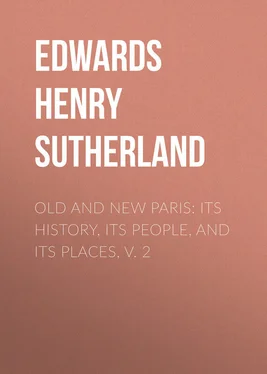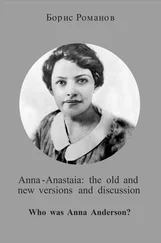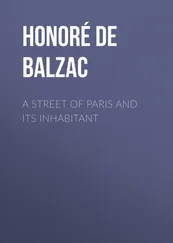Henry Edwards - Old and New Paris - Its History, Its People, and Its Places, v. 2
Здесь есть возможность читать онлайн «Henry Edwards - Old and New Paris - Its History, Its People, and Its Places, v. 2» — ознакомительный отрывок электронной книги совершенно бесплатно, а после прочтения отрывка купить полную версию. В некоторых случаях можно слушать аудио, скачать через торрент в формате fb2 и присутствует краткое содержание. Жанр: foreign_antique, foreign_prose, Путешествия и география, на английском языке. Описание произведения, (предисловие) а так же отзывы посетителей доступны на портале библиотеки ЛибКат.
- Название:Old and New Paris: Its History, Its People, and Its Places, v. 2
- Автор:
- Жанр:
- Год:неизвестен
- ISBN:нет данных
- Рейтинг книги:4 / 5. Голосов: 1
-
Избранное:Добавить в избранное
- Отзывы:
-
Ваша оценка:
- 80
- 1
- 2
- 3
- 4
- 5
Old and New Paris: Its History, Its People, and Its Places, v. 2: краткое содержание, описание и аннотация
Предлагаем к чтению аннотацию, описание, краткое содержание или предисловие (зависит от того, что написал сам автор книги «Old and New Paris: Its History, Its People, and Its Places, v. 2»). Если вы не нашли необходимую информацию о книге — напишите в комментариях, мы постараемся отыскать её.
Old and New Paris: Its History, Its People, and Its Places, v. 2 — читать онлайн ознакомительный отрывок
Ниже представлен текст книги, разбитый по страницам. Система сохранения места последней прочитанной страницы, позволяет с удобством читать онлайн бесплатно книгу «Old and New Paris: Its History, Its People, and Its Places, v. 2», без необходимости каждый раз заново искать на чём Вы остановились. Поставьте закладку, и сможете в любой момент перейти на страницу, на которой закончили чтение.
Интервал:
Закладка:
“A Parisian may for years walk round English society as he would walk round the wall of China, without being able to find either a door or a window. He understands absolutely nothing about it.
“In France, on the contrary, Englishmen find a greater social liberty. French society is an open society; French manners are cosmopolitan manners. The most diverse peoples can in France find their place without losing their national character. In our country everyone is at home, and the Englishman gets on comfortably enough. In the Englishman, however, it is necessary to distinguish between the citizen and the individual; for he is both. When the national interests or passions are in question he does not scruple to intrigue and conspire; when he is unconcerned with the politics of the country where he happens to find himself, he practises the greatest reserve and mixes in nothing. See the English at Paris. They assist at all our revolutions as mere spectators; their sole care is to get a good seat. They always come to their ambassador to request a presentation at the Tuileries and tickets for the court ball.”
So far we have presented the observations of M. Lemoinne for what they may be worth. That his skilful pen, however, penetrates sometimes into the regions of truth is shown by the fact that his remarks not infrequently recall those of foreign writers so famous as to be regarded more or less as oracular. Heine, after visiting London, complained that at an English dinner party the gentlemen, after the ladies had retired from the dining-room, remained at table for an hour or two to saturate themselves with port. Heine, it must be remembered, took a perverse delight in satirising everything English. But that we, in England, do leave the ladies to drink their after-dinner coffee in the desolation of the drawing-room must be handsomely admitted. M. Lemoinne notices this peculiarity.
“The time has passed,” he says – with burlesque drollery – “when the true Englishman remained at table for several hours after dinner and ended by slumbering beneath it. Now, when the ladies have quitted the dining-room, the gentlemen content themselves with circulating the Bordeaux for twenty minutes. In France we are beginning to divest ourselves of certain prejudices concerning the English. For a long time we regarded the English character as synonymous with ‘spleen.’ It was an old French author who said of the English: ‘They amuse themselves sadly, after the custom of their country.’
“The fact is the English are gay in their own fashion, and sometimes even expansive and noisy; but they are not gay with everybody, nor on a first acquaintance. They must unfreeze; they are like the wine of Bordeaux, which, to give forth its fragrance, has to be warmed.”
After this, however, a very dubious compliment is paid to our compatriots. “It is certain that this race is robuster than others, the women as well as the men. It spends more, consumes more, and absorbs more. See how well these pretty white and red-complexioned Englishwomen can take their sherry and their champagne! Observe them in the middle of the day going to exercise their palate at the pastry-cook’s with coffee, chocolate, ices, all kinds of cakes and sandwiches; you are staggered at the quantity of these delicacies they can put out of sight. See them at the buffets of all those official fêtes of which they form the finest ornament. It is a pleasure to see them, especially when you know that their appetite is not destructive of sentiment.” Now, however, for a compliment which is absolutely sincere. “We venture to say that English society in Paris has exercised a salutary influence on French society, and that it has introduced cordiality into intimate relationships. The handshake of the English lady, for instance, has long shocked, and still shocks our purists. Their fault is that they believe an amiable woman must be too accessible, and that a certain liberty of manners implies an equal liberty of conduct. With such ideas as these they bring up daughters who, having given the tips of their fingers, imagine that they have given everything and have no longer anything to protect; whereas a pretty little English girl who gives her hand gives nothing else, and knows how to defend the rest.”
Another trait of the English character is, we are assured, an “interest in religious questions.” English ladies are “all more or less theologians – veritable doctors in petticoats. English girls will hold forth to you on the subject of grace and free will. You will meet them at church, listening to sermons and going through services, and even taking notes. But what does that matter, since it does not prevent them from serving out the tea admirably, from rearing their children later on, and from being model housewives and model mothers? If our Frenchwomen cry ‘Fie’ upon the blue-stocking, that is perhaps because it is too green; a little theology would not hurt them. It is at church that you get the most comprehensive view of English society in Paris. On Sunday you have only to visit the Faubourg St. – Honoré towards two o’clock; you will encounter quite a procession of English men and women coming from the Rue d’Agnesseau, with their prayer-books and their Sunday demeanour. I say the church, but I ought to say the churches; for the English have nowadays in Paris almost as many chapels as religions. There is the Embassy chapel for Anglicans of the established religion, an English episcopal chapel in the Rue Bayard, another English chapel in the Rue Royale, a Scotch Presbyterian chapel and two English Methodist places of worship in the Rue Roquepine, independently of American chapels. This is not to say that the English observe Sunday in Paris as strictly as they are obliged to do in their own country. Respect for the Sabbath is an observance which they know very well how to dispense with amongst foreigners. On Sunday, from time to time, you see some individual in black attire, and invariably adorned with an umbrella, who, seated on one of the seats in a public garden, pretends to ignore a little pamphlet which is intended to be picked up by the first pedestrian who passes, and which turns out to be a dissertation on the observance of the Sabbath. There are still, perhaps, a few hotels specially designed for English people, where the Bible Society causes to be placed in every bedroom a copy of the Scriptures bearing its own stamp. This ardour of propagandism has begun, however, to abate, and the English in general are by no means the last to take advantage of the Paris Sunday. Anyone who has seen the Sabbath of London must feel the difference. Every Frenchman who has just missed dying, not only of ennui, but of hunger and thirst, during the hours of service in England – hearing his footsteps resound in the desolate streets – will understand the solace experienced by an Englishman on finding that the coast is clear for him at Paris and Versailles. There are, it is true, a certain number of English families who do not receive on Saturday evening because the festivity or the dancing might encroach upon the Sabbath; but what is a sin on English territory is not so on French territory, and the English do not scruple to pass midnight in a Parisian drawing-room.”
This drolly severe but, from a literary point of view, admirable writer seems to think that an Englishman is a sort of fox-terrier, or mastiff, which having been chained up for a length of time becomes, when you let him loose, extremely rampant and ill-conducted. “There are so many things the English would not do at home, that they do without scruple amongst foreigners. Once abroad they indemnify themselves for their national reserve; it is on the foreigner that they revenge themselves for the shackles of their own etiquette and social laws. In crossing the Channel they pitch their solemn vestments into the sea. In London they will not go to the opera dressed in anything but black; here they go in a tweed coat and a slouch hat.” After this Monsieur Lemoinne seems very much upset by the moustaches which Englishmen display as they promenade in the Boulevards. There was a time, he assures us, when a Frenchman crossing the Channel and wishing to have a fashionable air was obliged to sacrifice his moustache – a time when English caricaturists never represented a Frenchman without a pair of long, ill-combed moustaches. To-day the thing is reversed. It is the Englishman who wears this grotesque appendage which proclaims his nationality from afar. Thus moustached, the Englishman goes to Paris – so M. Lemoinne evidently thinks – to have his full fling. “Amongst us,” he says, “a grave man may occasionally dress up to go to a ball, wear fancy costume, or take part in a quadrille, and next morning resume his function as state councillor or referendary. So the Englishman precipitates himself into the French world as into a great masked ball, puts on a false nose, dances at Paris extravagant steps which he calls French dances, cuts capers, sups and gets maudlin, and when he has finished his French tour, tranquilly resumes his duties as member of parliament or no matter what.”
Читать дальшеИнтервал:
Закладка:
Похожие книги на «Old and New Paris: Its History, Its People, and Its Places, v. 2»
Представляем Вашему вниманию похожие книги на «Old and New Paris: Its History, Its People, and Its Places, v. 2» списком для выбора. Мы отобрали схожую по названию и смыслу литературу в надежде предоставить читателям больше вариантов отыскать новые, интересные, ещё непрочитанные произведения.
Обсуждение, отзывы о книге «Old and New Paris: Its History, Its People, and Its Places, v. 2» и просто собственные мнения читателей. Оставьте ваши комментарии, напишите, что Вы думаете о произведении, его смысле или главных героях. Укажите что конкретно понравилось, а что нет, и почему Вы так считаете.












